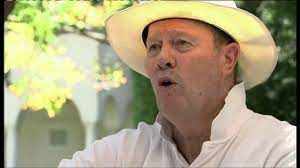Diwali 2024: When many spectators became thirsty for the blood of England player Tony Greig
Cricket News Desk. Unheard Cricket Tales (Cricket Tales) – The controversy over the recent stumping of Australian wicketkeeper Jonny Bairstow at Lord's, when he walked out of the crease even before the ball was hit, has become 'huge' today. Many new and old cricketers spoke on this issue – PMs of both the countries also clashed with each other on this dispute and the atmosphere got heated. An incident in the 'Spirit of Cricket' where many spectators became thirsty for the blood of England player Tony Greig and there was complete chaos in the stadium.
The day was 3 February 1974. West Indies' Bernard Julien bowled the last ball of the day close to the pitch. Tony Greig fielded the ball at silly midoff which non-striker Alvin Kallicharran took towards the pavilion. At that moment Greig hit the ball on his stumps – the aim was perfect and on appeal the umpire gave Kallicharan a run out. Kalicharan stopped when he heard the noise, turned to see what was happening, but he could not do anything and the out signal sent even a calm cricketer like him into a rage – he threw the bat on the ground in anger and stormed into the pavilion. . At first the spectators did not understand what had happened, but when the score board of the stadium showed the score 274-6 to 274-7, they understood everything. When Greg returned to the pavilion he was bloodthirsty and was abusing and making noise.
This was the first test of the series from the beginning. Mike Dennes lost the toss and was asked to bat in overcast conditions. Result- England out for 131 runs. The next day, West Indies also lost wickets but Guyana's short-bowled Khabboo Kalicharan settled and more than 30,000 people enjoyed his batting. Last ball of the day and the score was 274-6. The bowler was Derek Underwood. What Greg, everyone was desperate to dismiss Kalicharan who was batting on 142* runs at that time. Non-striker Kallicharan came out of the crease but when he saw that it was not a run stroke, he declared it an over and ended the day's play and went to the pavilion. It is true that umpire Douglas Song Hue had not yet called 'over' and according to Greig's biographer David Tossell, the umpire had no option but to give the batsman out. According to the rules of cricket, Kalicharan was out.
Substitute Geoff Arnold later wrote – 'The crowd was so angry they might have beaten us. The crowd went crazy and I thought we wouldn't make it out of Trinidad alive. Interestingly, even the British media was not with Tony Greig at that time. If this incident had happened in Jamaica or Guyana, the situation would definitely have been worse.
By then two important things had come to light. Firstly, Kallicharan was not alone in considering it 'the end of the over and the day's play' – England wicketkeeper Alan Knott ended the game himself and removed the bails from the striker's stumps – when Kallich was out as a non-striker. Was done. When given, Bell was removed from the stump at the other end. Second, after seeing the signal from the umpire, the score board operator first made the score 274-7 and then automatically brought it to 274-6. This 'error' of the operator saved the lives of England's cricketers – the spectators thought that the decision of out had been changed. Still, Tony Greig was not sent from the stadium to the hotel by the English team bus because there was a crowd of thousands gathered at the gate.
The West Indies Board called in more police and they knew that if the situation was not brought under control there would be riots in the streets. The players went to the hotel but the captain and manager of both the teams stopped them. English captain Dennis was accompanied by manager Donald Carr, who himself had been a captain and knew what it was like to play in the West Indies. A meeting was held with Board officials and the English representatives were told they had no option but to withdraw the appeal. After a three-hour meeting, the England management agreed to withdraw the appeal, meaning Kallicharran would be able to play further. A statement was issued saying that Tony Greig had no intention of breaking the spirit of cricket and that he was saddened by what happened. You can guess that all this was happening forcefully.
Arnold believed that if Kallicharran had not been allowed to bat the next morning, 'he would have killed us.' Denes said- 'When I went to the field to start the game on the third day, the spectators were showing me a small bag open which was full of empty glass bottles. He was saying – Hopefully Kalli will bat. If not then this is for you. I think we have taken the right decision to withdraw the appeal.
After a day's rest, on the morning of the third day, the England team officially withdrew the appeal and Kallikaran came to bat. He was out on a total of 158 runs. Despite all this, the West Indies Cricket Board suggested that Gregg be sent back to England in the middle of the series. England refused this. Tony Greig kept saying all his life that what mistake did he make by playing cricket?


Comments are closed.